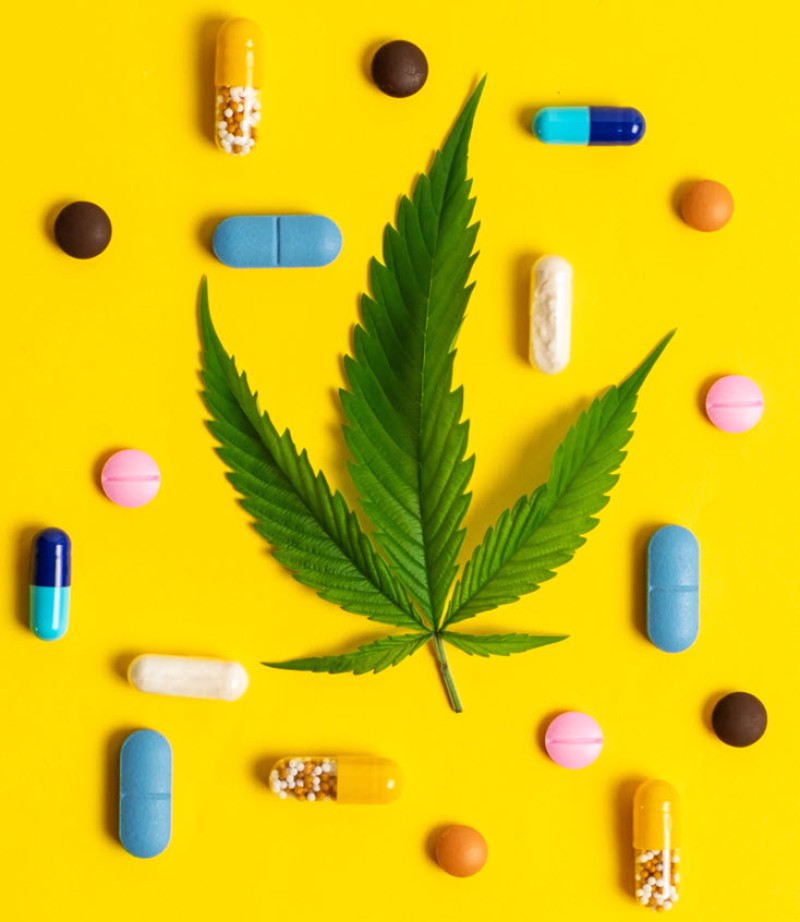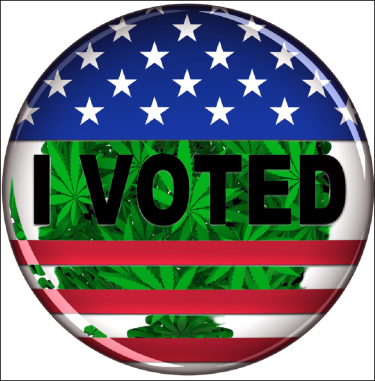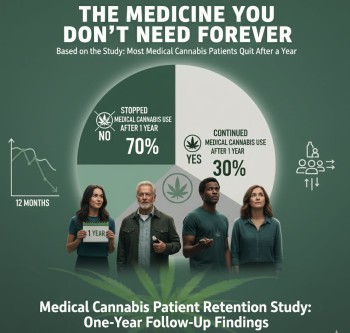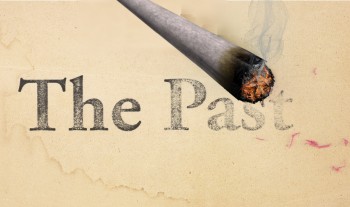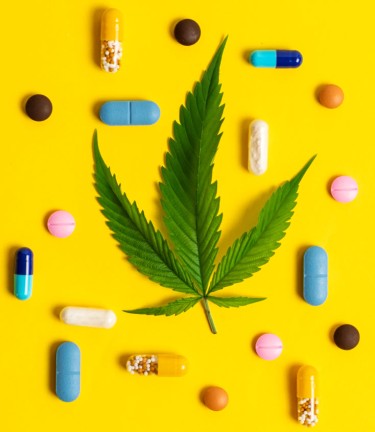
Here's a question that should keep you awake at night: if nearly 70% of Americans support cannabis legalization, if states are generating billions in tax revenue, and if medical benefits are increasingly undeniable, why does the federal government continue treating cannabis like it's more dangerous than fentanyl? The answer isn't found in science textbooks or public health data—it's written in pharmaceutical company profit reports.
A recent study published in Health Economics provides a smoking gun that prohibition apologists would prefer you ignore. Researchers found that cannabis legalization reduces prescription drug spending by approximately 6% in small group insurance markets, with the effect growing stronger over time. Translation: when people can legally access cannabis, they spend less money on Big Pharma's products.
Six percent might not sound earth-shattering until you consider the scale. Americans spend over $500 billion annually on prescription drugs. A 6% reduction represents $30 billion in lost pharmaceutical revenue—and that's just from the limited legalization we have now. Imagine the losses if cannabis became fully legal nationwide and people could freely choose plant medicine over synthetic pharmaceuticals.
But this isn't just about money, though the financial stakes are staggering. It's about power, control, and a monopoly so entrenched that it shapes everything from medical school curricula to CDC guidelines. If you learned anything from the COVID-19 debacle, it should be that pharmaceutical companies don't just sell drugs—they own the entire narrative around health and medicine in America.
The dirty secret prohibition defenders don't want you to discover is that cannabis remains illegal not because it's dangerous, but because it's too safe and too effective. When Richard Nixon handed drug manufacturing, distribution, and research to pharmaceutical companies in 1971, he created a legal monopoly that makes Standard Oil look like a corner lemonade stand. Cannabis threatens that monopoly, and monopolies don't surrender power voluntarily.
The Evidence: Cannabis as Big Pharma's Nightmare
The Health Economics study reveals what pharmaceutical executives have feared for decades: given the choice, people prefer cannabis to many prescription medications. The research, conducted by economists at Bowling Green State University and Illinois State University, examined prescription drug expenditures among privately insured working-age adults in states with cannabis legalization.
The findings are devastating for Big Pharma's business model. In small group insurance markets (typically companies with fewer than 50 employees), cannabis legalization reduced prescription drug claims by approximately 6%. More ominously for pharmaceutical companies, "the reduction in claims in the small group market grows stronger in magnitude over time and gains statistical significance during the second full year of legalized cannabis."
This isn't a one-time adjustment—it's a trend that accelerates as cannabis becomes more normalized and accessible. People are literally choosing plant medicine over pharmaceutical products, and they're doing so in increasing numbers as legal access expands.
Interestingly, researchers found no similar reduction among large group insurance plans, which they attributed to mandatory drug testing policies that larger employers typically impose. Think about what this reveals: when employees are free to choose cannabis without fear of losing their jobs, they reduce their reliance on prescription medications. When they're threatened with termination for cannabis use, they remain dependent on pharmaceutical products.
This pattern exposes the true function of workplace drug testing: not protecting safety (since alcohol isn't typically tested for despite being far more impairing), but protecting pharmaceutical market share by forcing employees to choose expensive, often addictive prescription drugs over safer, cheaper cannabis alternatives.
The study builds on previous research showing that medical cannabis laws are associated with reduced opioid prescriptions, lower Medicaid spending, and decreased healthcare premiums. A 2014 JAMA study found that states with medical cannabis laws had 25% fewer opioid overdose deaths. Another study showed that Medicare Part D spending dropped by $165 million annually in states with medical cannabis programs.
But here's where it gets really interesting: these studies only examine the effects of limited, highly regulated medical cannabis programs. Imagine the pharmaceutical industry's losses if cannabis were fully descheduled and available like any other herb or supplement. The 6% reduction we're seeing now could easily become 15%, 20%, or higher as access expands and stigma disappears.
NORML's Deputy Director Paul Armentano captured the implications perfectly: "Cannabis has established efficacy in the treatment of multiple conditions, including chronic pain, and it possesses a safety profile that is either comparable or superior to many prescription medicines, like opioids. As legal access continues to expand, one would expect more patients to integrate cannabis products into their wellness strategies in a manner that reduces their overall disease burden as well as their reliance on traditional prescription medications."
This is Big Pharma's existential nightmare: a safe, effective, non-patentable plant that people can grow in their backyards and use to treat conditions that currently generate billions in pharmaceutical profits.
The 1971 Monopoly: How Nixon Created Big P-Harm-a
To understand why cannabis remains federally illegal despite overwhelming public support, we need to examine the foundation of America's drug policy: the Controlled Substances Act of 1970, signed by Richard Nixon in 1971. This wasn't just drug policy—it was the largest corporate welfare program in American history, disguised as public safety legislation.
Nixon's domestic policy chief John Ehrlichman later admitted that the drug war was designed to criminalize and disrupt Nixon's political enemies: "The Nixon campaign in 1968, and the Nixon White House after that, had two enemies: the antiwar left and black people. We knew we couldn't make it illegal to be either against the war or black, but by getting the public to associate the hippies with marijuana and blacks with heroin, and then criminalizing both heavily, we could disrupt those communities."
But the Controlled Substances Act accomplished something far more sinister than political persecution—it created a legal monopoly on drug manufacturing, distribution, and research that persists today. By classifying substances into schedules and requiring DEA approval for research and production, Nixon essentially handed pharmaceutical companies exclusive control over America's drug supply.
Think about the perverse incentives this created. Pharmaceutical companies gained the legal right to manufacture and distribute drugs while simultaneously gaining the power to prevent research into competing substances by ensuring they remained classified as "dangerous" with "no medical value." Cannabis, despite being used medicinally for thousands of years, was placed in Schedule I—the most restrictive category—where it remains today.
This monopoly extends beyond just manufacturing. Pharmaceutical companies fund medical schools, write treatment guidelines, sponsor continuing education for doctors, and finance regulatory agencies through "user fees." The FDA, for example, receives nearly half its budget from pharmaceutical companies. The CDC accepts millions in pharmaceutical funding. Medical journals depend on pharmaceutical advertising revenue.
The result is a system where the same companies that profit from treating diseases also control the research, education, and regulation around potential treatments. It's like letting tobacco companies fund lung cancer research and write smoking guidelines—a obvious conflict of interest that we somehow accept as normal in healthcare.
Cannabis threatens this entire structure because it's a non-patentable plant that people can grow themselves. Pharmaceutical companies can't own cannabis the way they own synthetic molecules, which means they can't charge monopoly prices for access. Even worse, cannabis treats many conditions more safely and effectively than expensive pharmaceuticals, threatening multiple revenue streams simultaneously.
The COVID Revelation: Big Pharma's Media Control
If you had any doubts about pharmaceutical industry power over information systems, the COVID-19 response should have eliminated them permanently. We witnessed unprecedented coordination between pharmaceutical companies, regulatory agencies, media outlets, and tech platforms to control the narrative around treatments and vaccines.
Social media platforms banned discussions of ivermectin and hydroxychloroquine—not because these treatments were necessarily effective, but because they were off-patent and threatened pharmaceutical profits from newer treatments. Medical professionals who questioned vaccine mandates or suggested alternative treatments faced professional destruction. Media outlets that depended on pharmaceutical advertising revenue echoed industry talking points without critical analysis.
This same apparatus operates continuously to maintain cannabis prohibition. Pharmaceutical companies fund "research" designed to find harms associated with cannabis use, then amplify these findings through friendly media outlets and medical organizations. Remember that recent cardiovascular study we discussed? Within hours, it was featured across major news networks despite involving only 55 participants and acknowledging significant limitations.
Meanwhile, studies showing pharmaceutical harms get buried or minimized. Opioid addiction kills over 80,000 Americans annually, but cannabis—which has never caused a fatal overdose—remains federally illegal. Antidepressants can cause suicidal ideation and violent behavior, but cannabis—which often provides effective depression relief—faces continued criminalization.
The pharmaceutical industry spends more on marketing than research and development, with much of that budget going toward influencing doctors, regulators, and media coverage. They fund medical conferences, sponsor research, advertise in medical journals, and provide "educational" materials that shape how healthcare providers view different treatments.
This influence extends to medical schools, where future doctors learn to prescribe pharmaceuticals for every condition while learning virtually nothing about cannabis, nutrition, or other non-pharmaceutical interventions. Medical students graduate believing that health comes from a pharmacy rather than from plants, lifestyle changes, or other approaches that don't generate pharmaceutical profits.
The COVID experience revealed how quickly this apparatus can mobilize to suppress information that threatens industry interests. The same coordination that censored discussion of alternative COVID treatments operates continuously to maintain cannabis prohibition and suppress information about its medical benefits.
The Sticky Bottom Line
The question isn't really why cannabis remains federally illegal—it's why we continue pretending this has anything to do with public health or safety. Cannabis prohibition persists because it protects a trillion-dollar pharmaceutical monopoly that would face existential threats from plant medicine legalization.
The evidence is overwhelming: when people have legal access to cannabis, they reduce their consumption of expensive, often dangerous pharmaceutical products. The Health Economics study showing 6% reductions in prescription drug spending is just the beginning. As access expands and stigma disappears, those reductions will accelerate, threatening pharmaceutical profits across multiple therapeutic categories.
Big Pharma doesn't just sell drugs—they own the entire information ecosystem around health and medicine. They fund regulatory agencies, medical schools, research institutions, and media outlets. They write treatment guidelines, sponsor medical education, and shape how doctors learn to practice medicine. This apparatus operates continuously to maintain pharmaceutical monopolies while suppressing information about competing treatments.
The COVID-19 response revealed how quickly this system can mobilize to protect industry interests. The same coordination that censored discussion of alternative COVID treatments works daily to maintain cannabis prohibition through scare studies, media manipulation, and regulatory capture.
Cannabis threatens this monopoly because it's a non-patentable plant that treats multiple conditions more safely and effectively than many pharmaceutical products. People can grow cannabis in their backyards, but they can't synthesize opioids in their kitchens. Cannabis represents everything pharmaceutical companies fear: safe, effective, affordable medicine that they can't control.
Until we acknowledge that cannabis prohibition exists to protect pharmaceutical profits rather than public health, we'll continue seeing the same pattern: overwhelming public support for legalization, clear evidence of medical benefits, obvious policy failures, yet continued federal criminalization.
The solution requires more than just voting for pro-cannabis politicians—it requires dismantling the pharmaceutical monopoly that has captured our regulatory agencies, medical institutions, and information systems. We need to recognize that health comes from plants, lifestyle changes, and natural interventions, not just from pharmaceutical products.
Cannabis legalization isn't just about personal freedom or criminal justice reform—it's about breaking the pharmaceutical stranglehold on American healthcare. Every person who chooses cannabis over prescription medications represents a small victory against this monopoly. Every state that legalizes cannabis demonstrates that alternatives to pharmaceutical dependence are possible.
The pharmaceutical industry will continue fighting cannabis legalization because their business model depends on maintaining monopoly control over treatments. They'll fund more scare studies, influence more media coverage, and pressure more politicians to maintain prohibition. But their power depends on public ignorance about alternatives.
As more people discover that cannabis treats their conditions more safely and effectively than pharmaceutical products, the monopoly's foundation erodes. The 6% reduction in prescription drug spending we're seeing now is just the beginning. The real question isn't why cannabis remains illegal—it's how much longer the pharmaceutical monopoly can maintain control as more people discover the truth about plant medicine.
